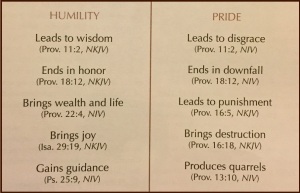ABRAHAM H. MASLOW, an American psychologist, presented five levels in the hierarchy of human needs beginning from physiological needs, which include the most basic ones such as food, water, clothing, and shelter. He said that only when these basic needs are satisfied can man progress to higher levels such as safety, belongingness and love, esteem, and self-actualization.
Unfortunately, many people today cannot even fully satisfy their basic necessities, as many are not properly nourished, clothed, and housed. Their desolate condition is further exacerbated by the worsening condition of the economy to due to unemployment, political instability, and terrorism. Consequently, more people are added to those who live below the poverty line. As as their chances of improving their wretched condition diminishes, they become anxious and feel hopeless.
“Look at the birds of the air, for they neither sow nor reap
nor gather into barns; yet your heavenly Father feeds them.
Are you not of more value than they?”
Do not worry
Fortunately, our Lord Jesus Christ comforts those who are in this kind of miserable situation. He said reassuring;
“Therefore I say to you, do not worry about your life, what you will eat or what you will drink; nor about your body, what yo will put on. Is not life more than food and the body more than clothing? (Mt. 6:25, New King James Version)
Why did our Lord Jesus say that we should not worry about the things we need in this life when, in fact, we really need all these things to survive? Our Lord explains further:
“Look at the birds of the air, for they neither sow nor reap nor gather into barns; yet your heavenly Father feeds them. Are you not of more value than they? Which of you by worrying can add one cubit to his stature? So why do you worry about clothing? Consider the lilies of the field, how they grow: they neither toil or spin; And yet I say to you that even Solomon in all his glory was not arrayed like one of these.
“For after all these things the Gentiles seek. For our heavenly Father knows that you need all these things.” (Mt. 6:26-29, 32, Ibid.)
The Almighty God, our Creator, knows what we need to survive, In fact, God gave us everything–food, water, air, and other resources–just as He provided the birds and other animals with their food and shelter. Thus, according to Christ, we should not worry about what we will eat or what we will drink. However, this does not mean that we should no longer work to find all these things. In fact, God commanded us to work hard in order for us to eat (Gen 3:19). Christ is only telling us that worrying too much far all the things we need as do the Gentiles who are without God (Eph. 2:11012) will not do us good. Besides, being too anxious about material things is tantamount to underestimating the power of God in giving us what we need.
Seek first the kingdom of God and His righteousness
Our Lord Jesus Christ clearly pointed out which man should seek first. he said:
“But seek first the kingdom of God and His righteousness, and all these things shall be added to you.” (Mt. 6:33, NKJV)
After having sought the kingdom of God and His righteousness, God will surely add to hi all the things he needs in this life. So, what man should put as priority is for him to be in the kingdom of God. Which is the kingdom referred to? It is the kingdom that God has given to the flock:
“Do not be afraid, little flock, for your Father is pleased to give you the Kingdom.” (Lk. 12:32, Today’s English Version)
Apostle Paul taught that the kingdom, which God has given to the flock, also refers to the kingdom of the Son into which man ought to be transferred for him to be redeemed by the blood of Christ. Apostle Paul wrote:
“Giving thanks to the Father,, Who has qualified and made us fit to share the portion which is the inheritance of the saints (God’s holy people) in the Light.
“[The Father] has delivered and drawn us to Himself out of the control and the dominion of darkness and has transferred us into the kingdom of the Son of His love,
“In whom we have our redemption through His blood, [which means] the forgiveness of our sins.” (Col. 1:12-14, Amplified Bible)
Significantly, the kingdom here on earth refers to the Church of Christ, which was purchased by the blood of Christ:
“Take heed therefore to yourselves and to all the flock over which the Holy Spirit has appointed you overseers, to feed the church of Christ which he has purchased with his blood.” (Acts 20:28, Lamsa Translation)
The Church of Christ was redeemed by the blood of our Lord Jesus Christ. If one is a member of the Church of Christ, then he has sought the kingdom of God where there is redemption and forgiveness of sins.
The righteousness
On the other hand, which is the righteousness of God which man should also seek? The righteousness of God is the gospel, which is the power of God to salvation for everyone who believes, for the Jew first and also for the Greek. For in it the righteousness of God is revealed from faith to faith; as it is written, ‘The just shall live by faith’.” (Rom. 1:16-17, NKJV)
The gospel is essential to the attainment of salvation. Thus, it is of utmost importance for man to hear the preaching of the gospel or the words of God through the duly appointed messenger, like Apostle Paul:
“Moreover, brethren, I declare to you the gospel which I preached to you, which also you received and in which you stand, by which also you are saved, if you hold fast that word which I preached to you–unless you believed in vain.” (I Cor. 15:1-2, Ibid.)
In these last days, the gospel of God has been entrusted to the messenger whose work is likened to that of a bird of prey. he will bring God’s righteousness to people. The prophecy declares:
“Calling a bird of prey from the east, the man who executes My counsel, from a far country. Indeed I have spoken it; I will also bring it to pass. I have purposed it; I will also do it.
“Listen to Me, you stubborn-hearted, who are far from righteousness: I bring My righteousness near, it shall not be far off; My salvation shall not linger. And I will place salvation in Zion, For Israel My glory.” (Is. 46:11-13, Ibid.)
This prophecy was fulfilled in Brother Felix Y. Manalo, the messenger of God in these last days who came from a country in the Far East–the Philippines. He began preaching the gospel; consequently, in fulfillment of the prophecy, the true Church of Christ emerged in the Philippines concurrent with the outbreak of the First World War on July 27, 1914, the time signaling the beginning of the period “ends of the earth” (Mt. 24:3, 6-8, 33).
And the promise
Having found the kingdom of the Son, which is the Church of Christ, and the righteousness of God, which is the gospel of salvation, members of this Church have the assurance that they will receive all the promises of God through our Lord Jesus Christ:
“If you remain in me and my words remain in you, then you will ask for anything you wish, and you shall have it.” (Jn. 15:7, TEV)
This is indeed a great privilege. While opportunities for other people are so elusive, they are, however, within reach for members of the Church of Christ who are always obedient to His words or commands. In the face of many hardships and difficulties plaguing the world today, the righteous servants of God have nothing to worry because they can always ask the Father all their needs through prayer. God surely will not lack in everything they need:
“Don’t worry about anything, but in all your prayers ask God for what you need, always asking him with a thankful heart.
“And with all his abundant wealth through Christ Jesus, my God will supply all your needs.” (Philip. 4:6, 19, Ibid.)
By NOEL I. ILAN
Source: God’s Message Magazine
Presented by Melinda de los Santos
*For Free Bible Studies click here 🙂














